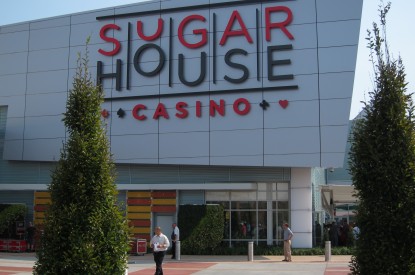Supplier News
US – Banned customer in SugarHouse for 70 hours
By Phil - 21 August 2013
Philadelphia’s SugarHouse Casino has been heavily criticised by the Pennsylvania Gaming Control Board for allowing a self-excluded problem gambler to play undetected at a craps table whilst in the casino for a 70 hour period.
At the Control Board’s July 17 meeting, it was revealed that the gambler had been banned for life his first exclusion violation. He managed to avoid detection despite his photograph having been displayed in staff quarters as a repeat offender.
Pennsylvania Gaming Board Commissioner Gregory Fajt said: “It boggles my mind that somebody can be in your facility for three days in one instance, four days in another, a known compulsive gambler on the list and not be recognised. It’s disheartening to me. We spend a lot of time and effort in our compulsive gambling program.”
The operator behind SugarHouse, Rush Street Gaming, claims the player avoided detection as he did not display any giveaway signs such as unruly behaviour, unkempt appearance or high wagering. He spent three-quarters of his time at the casino away from the tables.
Rosemarie Cook, Vice President of gaming at SugarHouse, said: “I assure you it was not a case of being asleep at the wheel.”
It was the third time the self-banned customer, has been caught playing in the casino following incidents in July 2012 and an earlier incident in January 2012.
Justine Griffin, a spokeswoman for Rush Street Gaming, said “We take the self-exclusion list very seriously and do our best to ensure that people who put themselves on it do not enter our casino. As we have done in every place we do business, we will partner with the state and local authorities to make sure that people who put themselves on the self-exclusion list stay out of our Millbury casino.”
The investigation carried out by the Pennsylvania Gaming Control Board and SugarHouse Casino, stated: “The investigation also revealed that after corrective actions were implemented, violations were reduced and compliance strengthened. The occurrence of these violations do not reveal any inherent or systemic weakness nor any pattern of intentional or negligent disregard of regulatory compliance responsibilities and none were deemed material to adversely impact the suitability of either the qualifying entities or individuals.”
Elaine Driscoll, a Spokeswoman for the state Gaming Commission, explained: “The Investigations and Enforcement Bureau is aware of this incident. As with every applicant, the Investigations and Enforcement Bureau maintains open lines of communications with gaming control boards in other jurisdictions. Ultimately every applicant will be judged by the totality of their compliance record. In addition, any applicant who is awarded a license by the Massachusetts Gaming Commission will be subject to rigorous oversight and enforcement by our Investigations and Enforcement Bureau.”
The Pennsylvania board rejected a proposed negotiated settlement agreement at its July meeting.
The earliest the matter would be addressed was September. 18.



